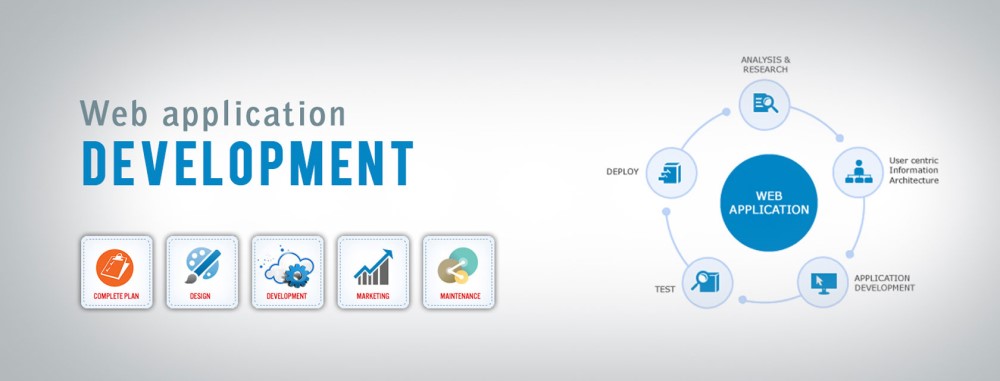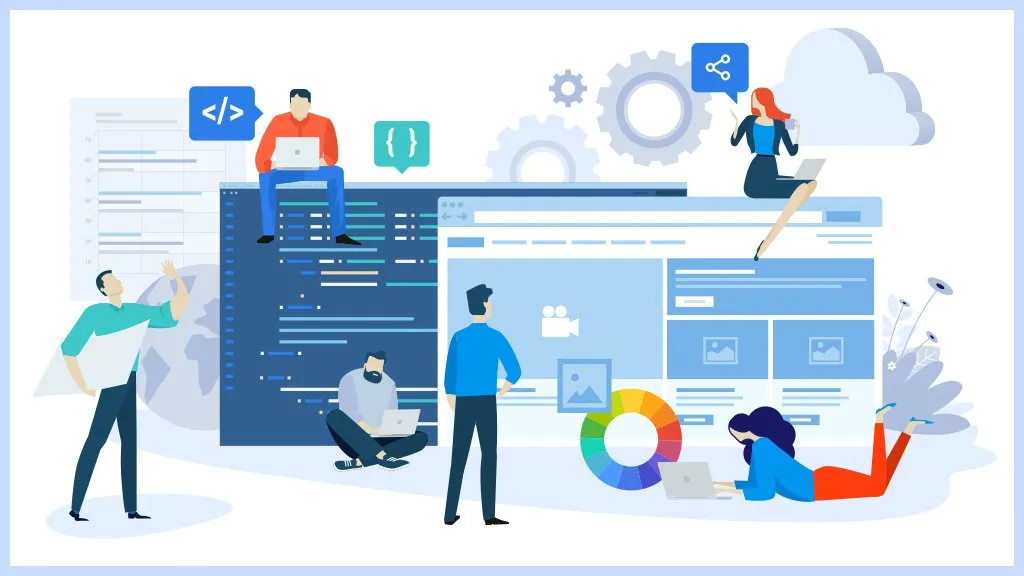Web-based applications have become an essential tool for businesses and organizations worldwide. With the increasing reliance on digital solutions, the demand for web applications continues to grow. In this article, we will explore the capabilities of web-based applications from an expert’s perspective and highlight the benefits they offer to businesses. Whether you’re a startup, a small business, or a large enterprise, understanding the power of web-based applications can help you make informed decisions when it comes to your software needs.
Introduction
In today’s digital era, web-based applications play a crucial role in providing efficient and accessible solutions to a wide range of industries. These applications are built using web technologies and can be accessed through a web browser, eliminating the need for traditional software installations. Web-based applications offer numerous advantages, including cross-platform compatibility, easy maintenance, and scalability.
Understanding Web-based Applications
-
Definition of web-based applications
Web-based applications, also known as web apps, are software applications that are accessed and used through a web browser. Unlike traditional desktop applications, web apps do not require installation on individual devices. Users can access web apps by simply navigating to a specific URL, making them highly accessible and user-friendly.
-
Examples of web-based applications
Web-based applications encompass a wide range of software solutions. Some common examples include:
-
- E-commerce platforms: Websites like Amazon and eBay that allow users to browse and purchase products online.
- Social media platforms: Applications such as Facebook and Instagram that facilitate social networking and content sharing.
- Online banking: Web apps provided by banks to enable customers to manage their accounts, make transactions, and access financial services.
- Project management tools: Platforms like Trello and Asana help teams collaborate, track progress, and manage tasks.
- Learning management systems: Online platforms like Moodle and Canvas that offer e-learning courses and educational resources.

-
Advantages of web-based applications
Web-based applications offer several advantages over traditional desktop applications:
-
- Accessibility: Users can access web apps from any device with an internet connection, providing flexibility and convenience.
- Cross-platform compatibility: Web apps are compatible with various operating systems, including Windows, macOS, and Linux, making them accessible to a wide range of users.
- Easy maintenance and updates: Since web apps are centrally hosted, updates and maintenance can be performed on the server side, eliminating the need for manual updates on individual devices.
- Scalability: Web apps can easily accommodate growing user bases and increased demand by leveraging cloud infrastructure and scalable technologies.
- Cost-effectiveness: Web apps eliminate the need for expensive software installations and hardware upgrades, reducing overall costs for businesses.
- Real-time collaboration: Web apps enable seamless collaboration among users by allowing multiple individuals to access and work on the same data simultaneously
The Expert Approach to Web-based Application Development
Building a web-based application requires expertise in various areas of software development. Here is an expert approach to web-based application development:

-
Analyzing client requirements
The first step in developing a web app is understanding the client’s requirements and objectives. This involves gathering detailed information about the target audience, desired features, and business goals. By conducting thorough requirements analysis, developers can ensure that the web app meets the client’s expectations and addresses their specific needs.
-
Designing user-friendly interfaces
User experience is a critical aspect of web app development. Designers work closely with developers to create intuitive and visually appealing interfaces that enhance user engagement. User interface (UI) design focuses on factors such as ease of navigation, responsive layouts, and clear call-to-action elements, ensuring a seamless user experience.
-
Implementing robust functionality
The functionality of a web app is determined by its underlying codebase and the technologies used. Developers utilize programming languages such as JavaScript, Python, or PHP to implement the desired features and functionalities. This includes backend development for data processing, frontend development for user interactions, and integration with external services or APIs.
-
Testing and quality assurance
Thorough testing is crucial to ensure the reliability, security, and performance of a web app. Quality assurance professionals conduct various testing methodologies, including functional testing, compatibility testing, security testing, and performance testing. This helps identify and resolve any issues or bugs before the web app is deployed.
-
Deployment and maintenance
Once the web app has undergone rigorous testing, it is ready for deployment. This involves hosting the application on a server or cloud platform and configuring the necessary infrastructure. Continuous monitoring and maintenance ensure that the web app remains functional, secure, and up to date with the latest technologies.
Key Features and Functionality of Web-based Applications
Web-based applications offer a wide range of features and functionality to cater to diverse user needs. Here are some key aspects:

-
Responsive design and cross-platform compatibility
Web apps are designed to adapt to different screen sizes and devices, ensuring a consistent user experience across desktops, laptops, tablets, and smartphones. Responsive design techniques, such as fluid layouts and media queries, enable web apps to automatically adjust their interface based on the user’s device.
-
User authentication and access control
Web apps often require user authentication to ensure secure access to sensitive data or personalized features. This can be achieved through various authentication methods, such as username/password login, social media login integration, or two-factor authentication (2FA). Access control mechanisms allow administrators to manage user permissions and restrict certain functionalities based on user roles.
-
Data management and storage
Web apps rely on databases to store and manage data. Whether it’s user profiles, product catalogs, or transaction records, efficient data management is crucial for web apps to operate smoothly. Database technologies such as MySQL, PostgreSQL, or MongoDB are commonly used to handle structured and unstructured data.
-
Integration with other systems and APIs
Web apps often need to integrate with external systems, services, or APIs to enhance functionality or exchange data. Integration with payment gateways, social media platforms, third-party APIs, or cloud services enables web apps to leverage existing infrastructure and provide a seamless user experience.
-
Performance optimization and scalability
Web apps should be optimized for speed and performance to deliver a smooth user experience. Techniques like caching, code minification, and content delivery networks (CDNs) help reduce loading times. Additionally, web apps should be designed to handle increased traffic and user demand, allowing for scalability through load balancing and server clustering.
Industries and Use Cases for Web-based Applications
Web-based applications find applications in various industries, providing solutions tailored to specific needs. Here are some industries and their use cases:
-
E-commerce and online retail
Web-based applications power online shopping platforms, enabling businesses to showcase products, manage inventory, process payments, and provide a seamless shopping experience to customers.
-
Education and e-learning
Web apps offer e-learning platforms and learning management systems (LMS) that provide educational resources, online courses, interactive quizzes, and progress tracking for students and teachers.
-
Healthcare and telemedicine
Web-based applications facilitate telemedicine consultations, appointment scheduling, electronic health record management, and remote patient monitoring, improving access to healthcare services.
-
Finance and banking
Web apps enable secure online banking, fund transfers, account management, and investment portfolio tracking, empowering users to manage their finances conveniently.
-
Project management and collaboration
Web-based project management tools allow teams to collaborate, track tasks, share documents, and communicate effectively, streamlining project workflows and enhancing productivity.
Benefits of Choosing Desol Int for Web Application Development
At Desol Int, we understand the importance of delivering high-quality web application development services. Here are the benefits you can expect when you choose our company:
-
Expertise and Experience
Desol Int brings a wealth of expertise and experience to every web application development project. Our team of skilled developers has a deep understanding of industry best practices, emerging technologies, and the latest trends in web development. With our knowledge and proficiency, we can create web applications that meet your specific requirements and exceed your expectations.
-
Customization and Scalability
We believe in providing tailored solutions to our clients. When you choose Desol Int for web application development, we take the time to understand your unique business needs and goals. Our team works closely with you to design and develop a web application that is customized to your exact specifications. We ensure that the application is scalable, allowing it to grow and adapt as your business expands.
-
Timely Delivery and Ongoing Support
At Desol Int, we value your time and understand the importance of meeting deadlines. We follow a streamlined development process to ensure that your web application is delivered on time, without compromising on quality. Additionally, we offer ongoing support and maintenance services to keep your web application running smoothly. Our dedicated support team is always available to address any issues and provide timely assistance whenever you need it.
-
Security and Data Protection
We prioritize the security and protection of your data. Desol Int implements robust security measures to safeguard your web application and sensitive information. Our developers follow industry best practices for secure coding, encryption, and authentication to mitigate potential threats. With our comprehensive security measures in place, you can have peace of mind knowing that your web application and user data are well-protected.
-
Competitive Advantage
Choosing Desol Int for your web application development needs gives you a competitive edge in the digital landscape. Our team is committed to delivering high-quality, innovative web applications that set you apart from your competitors. We focus on creating user-friendly interfaces, seamless functionalities, and engaging user experiences that leave a lasting impression on your target audience. With our web applications, you can gain a competitive advantage and drive business growth.
Partnering with Desol Int for web application development ensures that you have a dedicated and experienced team working on your project. We are passionate about delivering exceptional results and helping businesses thrive in the digital world.
Conclusion
Web-based applications have revolutionized the way businesses operate and interact with their customers. Their accessibility, scalability, and wide range of functionalities make them indispensable tools for organizations across industries. By understanding the expert approach to web-based application development and the benefits they offer, businesses can harness the power of web apps to drive growth, streamline processes, and enhance user experiences.
FAQs
Q. What is the difference between web-based and desktop applications?
Web-based applications are accessed through a web browser and do not require installation on individual devices, while desktop applications need to be installed locally. Web-based apps offer greater accessibility and cross-platform compatibility, whereas desktop apps may provide more advanced functionality and offline capabilities.
Q. Can web-based applications be accessed on mobile devices?
Yes, web-based applications can be accessed on mobile devices as long as they have an internet connection and a compatible web browser. Web apps can adapt to different screen sizes and provide a responsive user interface for mobile users.
Q. How long does it take to develop a web-based application?
The development time for a web-based application depends on various factors, including the complexity of the app, the number of features, and the expertise of the development team. Generally, it can take several weeks to several months to develop a fully functional web app.
Q. Are web-based applications more secure than traditional software?
Web-based applications can be as secure as traditional software applications when proper security measures are implemented. Professional web developers follow best practices for secure coding, encryption, and authentication to ensure the security of web apps and protect user data.
Q. Can existing web applications be upgraded or redesigned?
Yes, existing web applications can be upgraded or redesigned to incorporate new features, improve performance, or enhance the user experience. Web development companies can assess the existing app, identify areas for improvement, and provide solutions for upgrading or redesigning the web application.
